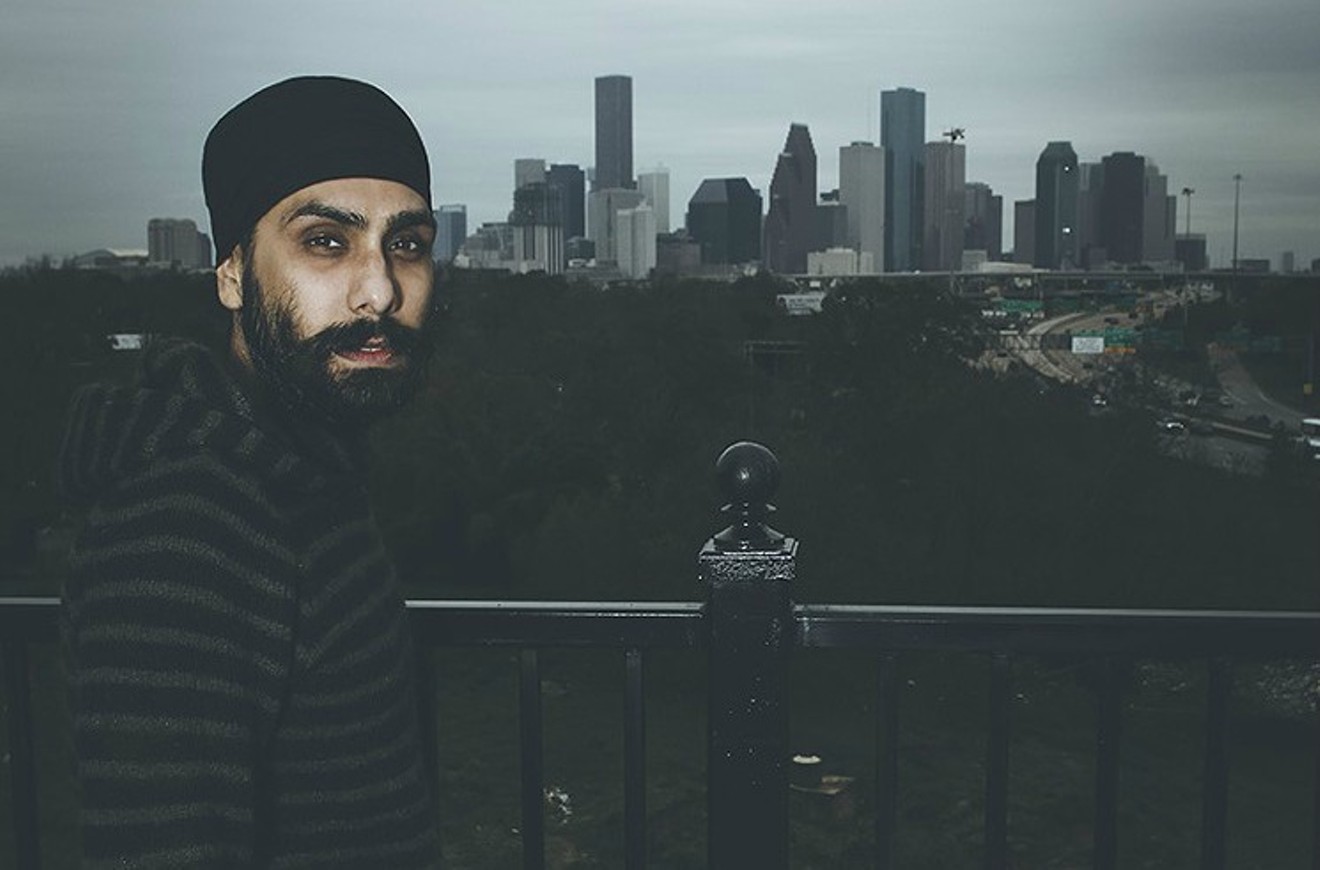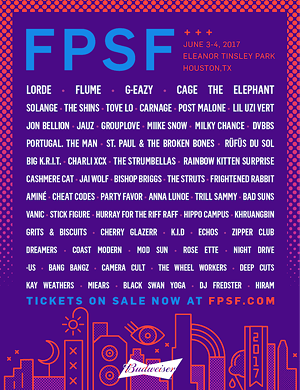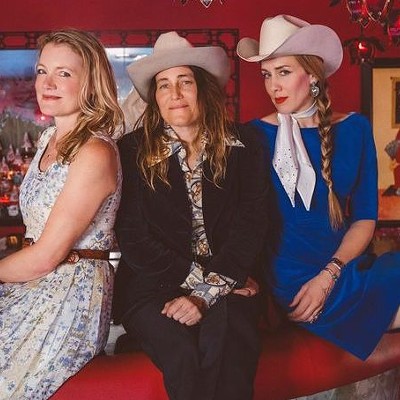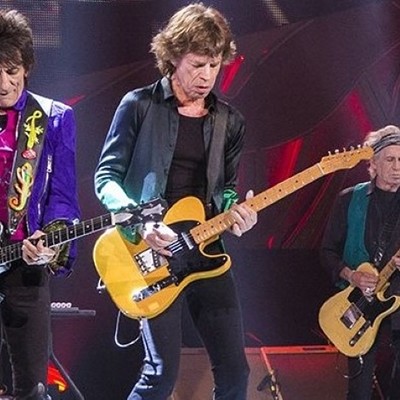It’s not at all normal for representatives of a major city’s biggest music festival to reach out to the media with an offer to clear up the misconception that said festival is no longer under local control. But in this case, it’s just smart PR. Pegstar Concerts’ Jagi Katial, who started Free Press Summer Fest in 2009 with Free Press Houston publisher Omar Afra, says he called up one of FPSF’s vendors to ask a question not long ago, only to be asked himself if he’d like to be on this year’s guest list. The vendor told him, “‘Oh, I didn’t even know you had anything to do with the festival anymore,’” recalls Katial. “I’m like, ‘Okay…’”
FPSF hit its zenith in 2014, drawing an estimated 100,000 fans to Eleanor Tinsley Park. But between the uproar over R. Kelly’s performance the next year; two flooding-induced relocations to NRG Park in a row; and the death of an 18-year-old girl last year, the festival has been a whirlwind of headlines ever since, most of them pretty sensational. Nearly lost in the shuffle, not least because the news didn’t come out until a few days after FPSF 2016, is that a major behind-the-scenes change had taken place in December 2015, when Afra sold his stake in FPSF to C3 Presents and founded Day For Night. C3 itself, producers of the Austin City Limits Music Festival, various Lollapaloozas and numerous lesser festivals, had been acquired several months prior by Live Nation. Indirectly, that makes FPSF an appendage of one of the world’s leading live-entertainment corporations, one that in the past few years has really begun muscling into the North American festival market.
In that context, rumors like the ones that got back to Katial, who founded Pegstar in 2002, seem a little less wild. But, as is often the case, he says the reality is much more mundane: He and Pegstar colleague Jason Petzold still supervise the festival's booking; site-ops chief Tony Terwilliger is a FPSF veteran of several years' standing; and the support crew — everything from stagehands to security — remains overwhelmingly Houstonian. Where C3 has really thrown its weight around, he notes, is on the logistical end — “They rent stages from one of three companies, I don’t know, 100 times a year, and we’d rent it from the same three companies once a year,” says Katial, also a partner in White Oak Music Hall. “So you can just do the math as far as what that’s going to mean.
“Those kind of things are very helpful for the longevity of FPSF,” he adds. “To be able to keep it as an institution, you have to be able to think long-term. So that’s the main motivation — Houston is the fourth-largest city in the country, and the music market is going from a place from where it was a smaller market to becoming a major market; we need to compete at a major level. My responsibility is to bring the best team together to do that. So that’s what we’re doing.” [Note: The following interview has been edited and condensed.]
Houston Press: How would you personally characterize the last two or three festivals?
Jagi Katial: Well, I would say the last two for sure have been a major struggle. A big undertaking, coupled with a changing music landscape internationally, like what people are listening to, how many music festivals exist and the options people have has changed over the last three years, or from a decade ago when we started. But moreover, the weather issues we’ve been dealing with the last two years, like I said, have been a big struggle. Now obviously we’ve got a team in place that was able to both years move the festival very last-minute with, you know…the first year with no contingency plan actually drawn out, just the site. So we were able to do it, but I would say they’ve not been what the festival is really about. The festival is about this park, you know?
It’s supposed to [have been] raining this whole week; I’m glad that we’re building out there right now and the weather has been letting up on us. It’s been great. Part of the identity of this event is definitely tied to its being at a downtown city park. It’s a major part of it.
The festival feels smaller this year; it's only four stages. Was there talk that things had gotten a little out of hand?
FPSF has to be fluid to change. It’s not about the 38-year-old who went ten years ago. And it’s not about the 19-year-old who’s going for the first time. It’s a combination. The big difference now is when we first started, it was people in Montrose, Heights, Inner Loop that we stocked to; and the first year, two years, that’s pretty much who came to the festival.
Those 19-year-olds I’m referring to live out in Katy and they know about this festival because it’s existed forever, and their older brother went. Which is great, but what that really means is that it would be ridiculous for us to pretend that that wasn’t the case, and to serve the city we have to serve the people who are interested in going to a music festival. It’s a long way of saying if you want to book a Lorde on a lineup, well, that takes a lot of money. So when there’s four festivals in the market, and probably another ten within three hours of Houston in a given year, you have to do a lot of soul-searching of what the city needs or wants, or what [it] can provide and where we fit into that, and do the best that we can.
The issue was mainly like, ‘Are we serving a purpose having seven stages? Should we be saving those costs and providing something else? Does it make more sense for us to, you know, get someone like a Lorde versus someone smaller so we can have two other stages that have a bunch of bands that people have yet to learn about?' I don’t know. That costs a lot of money to have seven stages; you know, that’s hundreds of thousands of dollars that we’re now basically putting back into talent. At least that was the decision for this year.
Moving forward, I think you’re going to see a lot of other changes. I think that’s what makes this festival beautiful, is all the things that are frustrating about it, like the park has literally been under construction for a decade. No lie. You drive down Allen Parkway now, you can’t recognize that street from [three] years ago, since the last time we had a festival there. It looks nothing like it.
But that’s what also keeps it fresh, from our side working on it. The festival hasn’t had the same layout two years in a row. It’s ever-changing, just like Houston. This year it’s four stages. I’m not committing that there’s going to be four next year; there might be five. We’re going to try to do the best thing that make sense for the festival at that time, in the present.
How tough is it to compete with other festivals nowadays versus when you started?
When we started we weren’t competing against anyone. We were just competing against logic, like, ‘Let’s put a festival in the rainiest time of the year in a ditch.’ If somebody told me that today, I’d look at them like they needed to go see a doctor.
But the overall idea, that makes a lot of sense. Back then it didn’t exist, really. The Westheimer Street Festival was going away. There was definitely niche stuff, like the Bob Marley Festival, but a non-genre-specific, somewhat alternative music festival didn’t exist.
But now it’s competitive, not necessarily a bad thing. More of the 4 million people that live here are music fans than ten years ago, and I think FPSF is a major component in developing that. And I think the fact that local people were instrumental in creating [that], like, if a small percentage of 4 million people are interested in music, I think that’s probably gone up by tenfold. So that’s why there can be four music festivals in the market.
How helpful is it having C3 as a partner?
Jason and I, Christian Larson, we do this every day [and have for 15 years]. The difference there is their expertise, and having done it longer, and at more different levels of the business, and having more people on the team. Like, they book theater shows, they book festivals, they book clubs, they book arenas, they manage artists, so there’s like different aspects of the business they have access to, and that gives us information. They have that information, they have that experience, and that’s where the help comes from.
Before, when we first started the festival, [I was] completely isolated from the music industry in Houston, Texas, where there is no music industry, and I’m just kind of shooting out in the dark: ‘Oh, I’d like to have Broken Social Scene play’; like, ‘Hey, what do you have available?’ So it’s exponentially helpful when your partner has 25-30 people that do this all day, every day.
Which acts are you proudest to have at the festival this year?
For me, it’s a big deal to have our first female headliner. Nine years in, we’ve never had a woman at the top line, so that’s kind of cool. Beyond that, I dig Lorde, so I’m happy about that. Solange, again, woman, maybe more important for me, a Houstonian, so that’s really cool. She put out a really great record last year, so it’s great to have that homecoming show here. It’s a big deal. I’m really excited Portugal the Man has grown to a level to where they’re closing a stage now. They’ve become close friends of mine over the years of playing shows with us, and seeing that band develop into what easily become [a] crazy stadium band someday is pretty cool.
Post Malone, that’s something that at face value I couldn’t relate with, but I listened to the record and totally dig it, and am excited to see him play. He’s from Dallas, so that’s like another Texas love kind of thing, which I’m down with. There’s stuff sprinkled through there, but those are the ones that stand out the most.
Talk a little bit about the new features this year, or the differences from past years.
The biggest new feature is that people who haven’t been to the festival [since] more than two years ago, they’re going to get to experience the festival the way it was conceived, at Eleanor Tinsley Park.
How excited are you to be coming back?
Look, the people at NRG are like godsends and saviors, who two years in a row with no notice have stepped up and saved us. Those are professionals, and they know what they’re doing and can help us put on a festival with no planning in a week.
But Eleanor Tinsley Park is the soul of this festival, essentially. So to us, coming back there is not an option, really, it is what we need to do. We’ve had discussions of should we just move the festival permanently to NRG, or just somewhere else, and over and over and over the consensus — company-wide, team-wide — has been FPSF belongs at Eleanor Tinsley Park. I don’t know if I can tell you how excited we are; it’s more like we’re coming home, and we’re happy about that.
Free Press Summer Fest returns to Eleanor Tinsley Park, 500 Allen Parkway, this weekend. Gates open at 11 a.m. Saturday and Sunday; see fpsf.com for details.
Support Us
Houston's independent source of
local news and culture
account
- Welcome,
Insider - Login
- My Account
- My Newsletters
- Contribute
- Contact Us
- Sign out

Jagi Katial at Raven Tower in 2016
Photo by Marco Torres
[
{
"name": "Related Stories / Support Us Combo",
"component": "11591218",
"insertPoint": "4",
"requiredCountToDisplay": "4"
},{
"name": "Air - Billboard - Inline Content",
"component": "11591214",
"insertPoint": "2/3",
"requiredCountToDisplay": "7"
},{
"name": "R1 - Beta - Mobile Only",
"component": "12287027",
"insertPoint": "8",
"requiredCountToDisplay": "8"
},{
"name": "Air - MediumRectangle - Inline Content - Mobile Display Size 2",
"component": "11591215",
"insertPoint": "12",
"requiredCountToDisplay": "12"
},{
"name": "Air - MediumRectangle - Inline Content - Mobile Display Size 2",
"component": "11591215",
"insertPoint": "4th",
"startingPoint": "16",
"requiredCountToDisplay": "12"
}
,{
"name": "RevContent - In Article",
"component": "12527128",
"insertPoint": "3/5",
"requiredCountToDisplay": "5"
}
]
KEEP THE HOUSTON PRESS FREE...
Since we started the Houston Press, it has been defined as the free, independent voice of Houston, and we'd like to keep it that way. With local media under siege, it's more important than ever for us to rally support behind funding our local journalism. You can help by participating in our "I Support" program, allowing us to keep offering readers access to our incisive coverage of local news, food and culture with no paywalls.
Chris Gray has been Music Editor for the Houston Press since 2008. He is the proud father of a Beatles-loving toddler named Oliver.
Contact:
Chris Gray
Trending Music
- How Much Longer Can Classic Rock Rule the Roost?
- Houston Concert Watch 4/24: Rolling Stones, Bad Bunny and More
- Top 10 Butt-Rock Bands of All Time
-
Sponsored Content From: [%sponsoredBy%]
[%title%]

Don't Miss Out
SIGN UP for the latest
Music
news, free stuff and more!
Become a member to support the independent voice of Houston
and help keep the future of the Houston Press FREE
Use of this website constitutes acceptance of our
terms of use,
our cookies policy, and our
privacy policy
The Houston Press may earn a portion of sales from products & services purchased through links on our site from our
affiliate partners.
©2024
Houston Press, LP. All rights reserved.






